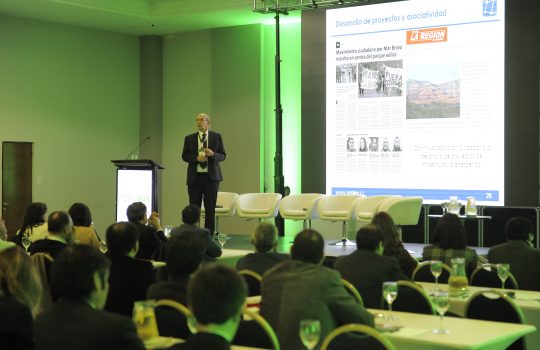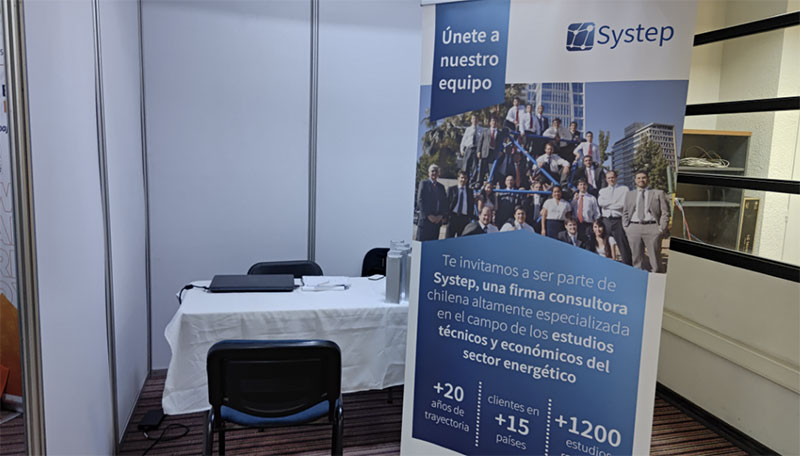
Expert highlights continuity of national energy policy
(El Sur Newspaper) It is very valuable that the new government continues and builds on the good experiences and developments achieved in previous governments. This was highlighted by Hugh Rudnick, director of Systep and academic of the Pontificia Universidad Católica, who opened the VI Version of Foro Eléctrico del SUR 2018, with his talk “Ruta Energética 2018-2022: impactos y alcances en la zona centro sur del país”, which was held yesterday at the Sonesta Hotel and which brought together experts, academics, electric companies and authorities of the sector.
The electricity expert pointed out that the new formulation of the Energy Route proposed by the current government coincides with the Energy 20-50 plan of the previous government. This reflects the interest of the new authorities to follow and take advantage of the good experiences and developments of previous periods, obviously correcting those situations where there are problems. “But a state policy is formulated in energy matters that has been highlighted by different agents of society and of the industry in particular, who see that here there is an attempt to maintain a policy that does not change according to the political turn of each government,” he said.
[SEE ALSO: CNE plans to make changes in the distribution tariff process].
Partnership
Rudnick also highlighted the government’s interest in reviving a concept that had already been formulated in the previous government but without much success, namely that of associativity. This is how to make the municipalities and regions partners in the development of energy infrastructure, an issue that is currently a problematic situation. He recalled that today there is opposition to various projects such as a wind farm in Chiloé and a transmission line (Cardones-Polpaico) that will connect the north with the south of the country.
There, the purpose is to initiate 25 energy associativity projects with society, with the communities, which appears as something very challenging and interesting, which is how to convince and identify which are the social benefits for the communities and for the regions of these developments to take place.
The academic added that the benefits can be very diverse, such as the Tariff Equity Law, which sought to ensure that the districts that had a lot of generation had lower tariffs, because it could not be that districts such as Alto Biobío had the highest tariffs in the country. “This is a step forward, but we have to go in other directions as well and adapt energy projects that solve regional problems or do not produce them.”
He gave the example of a company that is building a hydroelectric power plant in this Region, but that sought with the community the best way to produce the least impact, even deciding to change the physical installation of the plant from one side of a river to the other in order to minimize the impact. “That kind of benefit is what society, interacting with the projects, seeks to improve them so that they do not produce a harmful impact,” he said.
In Hugh Rudnick’s view, perhaps the most challenging issue for the government is the new Electricity Distribution Act.
He said that in the world of distribution a brutal technical change is taking place; distributed generators are appearing, electric cars, companies that are seeking to group consumers to obtain better resources, there are other consumer aggregators, that is, there are a series of new players that are finding opportunities. This is where the great challenge of how to separate the regulatory separation of the “wires” company, which is the distribution company that provides these wires to produce the business income, with another world of multiple agents that sell and buy energy, that manage electric cars, that manage electric storage, so that this remuneration of the wires can coexist and also be efficient, with this world of competitive actors and provide better services to users.
Although Rudnick warns that we are behind at the moment in this area, because we still have very old legislation dating back to 1982 that has not taken into account the technological changes that are taking place and that are already in the country, he says he is optimistic. “The government believes that in one year it will manage to make the change, only that there is concern that this will be done independently of the particular interests of the agents that involve many economic resources, both of the distribution companies and of the new agents that are looking for business opportunities.”





